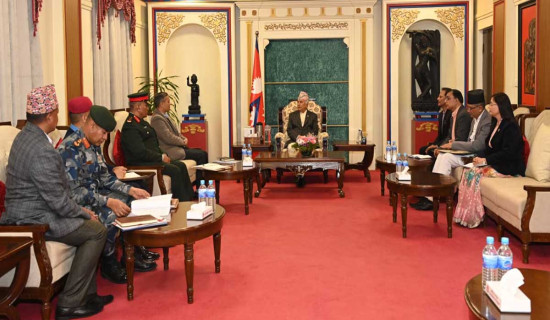- Saturday, 14 February 2026
Ensure Labour Rights Of Journalists
In a recent Facebook post, Janmadev Jaisi, one of media rights activists in Nepal, published that Jyoti (name changed) and Bipana (name changed) got justice. As he was constantly looking on labour rights issues, it was not hard for me to understand that the journalists received their pending salary. This is one of the stories of ‘win’. The cases, however, don’t represent the whole. The fight of many media workers for justice in similar cases, has not reached a logical conclusion. Working for prolonged hours and even during weekend without getting salary at least for few months is the everyday reality of the most of media workers in private media.
According to the Federation of Nepali Journalists (FNJ), more than 300 journalists from print, online and broadcast media filed report of alleged unfair treatment by their employers in 2021-22 while FNJ’s report also shows that around 200 journalists got their labour rights issue addressed last year. It is equally important to note that the number of journalists remaining silent despite facing labour exploitation is quite higher. The data altogether led to predict that thousands of journalists and media workers in Nepal, have been facing different sorts of labour rights violations such as illegal sacking, underpay, non-payment, illegal retrenchment, delayed payment in 2022- 2023.
Labour exploitation
More importantly, labour exploitation of women journalists is more severe due to increased gender pay gap. They are placed at front row to send to leave without pay, retrenchment and pay cut, among others. All those who dared to report the case are not lucky like Jyoti and Bipana. A television journalists whom I talked to, claimed that his accumulated salary due is more than Rs 500,000. The television journalist and his team has recently filed a case against the television-owner in cheque- bounce case as the cheque the television provided was bounced due to insufficient cash in the bank account.
Further, despite the advocacy efforts of FNJ, Nepal Press Union (NPU) and Working-journalist Association of Nepal (WOJAN) organising demonstration, media house visit, submission of memorandum and position papers, etc., many of the agreements made are not implemented or partially implemented. This apart, there are many untold stories of the psychosocial upheaval either due to the labour exploitation or the systematic harassment on journalists and media workers by their employers following their fights for rights.
The economic exploitation of media workers begins right from the very day a journalist/ media worker joins a media house. Generally, journalists in most of the private media houses are hired based on recommendation. The formal recruitment process that comprises of assessing the human resource need, preparing job descriptions, devising recruitment strategy, screening and shortlisting candidates, conducting examination/ interviews, evaluation and making the offer, is not followed. The newly-hired media workers falsely believe that the hiring managers’ trust in the former’s capabilities had led to the process getting waived off.
The media house, then asks the newly-hired journalist to start the work sooner hinting that necessary administrative formalities such as signing the contract can be done later. The journalists show unnecessary gratitude to the hiring manager by agreeing to sign the contract later. Unfortunately, ‘the later’ that the media-management promised, will never come to some while others who received the contract document after ‘few months’, will be not in a position to negotiate their salary and other benefits. Most of them accept what was offered because they don’t like to quit the job raising voice against the employer.
The second phase of exploitation takes place upon completion of the first month. In case where journalists and media workers are not given contract document, they are not considered for salary deposit. Rather they get fringe amount in cash from media houses that too if continuously followed up. These workers are more vulnerable to other sorts of exploitation as well. Such a phenomenon has a multiplier effect. When staffs are fired simply for asking salary, journalists, despite having contract document, can’t ask for the insurance, travel expenses and other benefits.
According to the International Federation of Journalists (IFJ), the economic exploitation of journalists had gone into stratosphere during the outbreak of COVID-19. A senior reporter of a reputed daily newspaper in Kathmandu, recalled his salary getting deducted by 60 per cent following the outbreak. Media employer used COVID-19 as an excuse to arbitrarily cut salaries, send editorial staffs and media workers on unpaid leave or force them to volunteer.
Fear of management
Despite getting exploited, journalists cannot raise their voices against employers because doing so may minimise their chance of receiving a job even in other media houses. Other journalists also hesitate to support you fully in fear of being a target of media management. In such situation, the journalist fighting for labour rights may feel betrayed. The root cause of the current labour exploitation lies in the tendency of the media employers to think journalists as dispensable. Despite inflation has skyrocketed, journalists are grossly unpaid or underpaid.
Minimum pay scale of journalists, set by the government, is Rs. 24,375 that is not enough for living but most of the media houses hardly abide by the provision. It is true that many media houses are facing losses due to shrinking of advertisement revenue and sales. However, this doesn’t provide the media employers any excuse to further exploit media workers.
(Pokharel is former South Asia Coordinator of International Federation of Journalists (IFJ) pokharel.umesh@gmail.com)
















-original-thumb.jpg)
